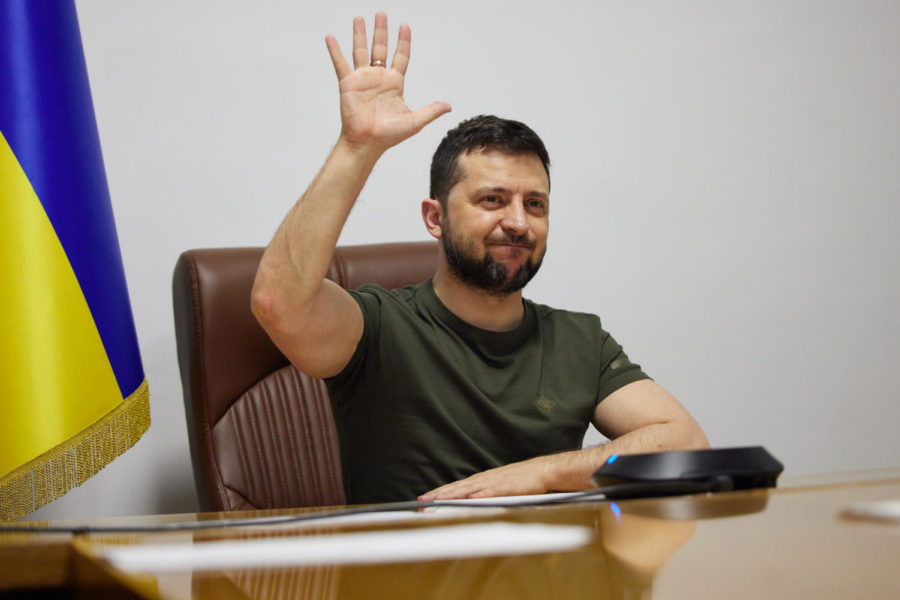The Global Response to Putin’s Invasion of Ukraine
President of Ukraine Volodymyr Zelenskyy delivers an impassioned speech to the Australian Parliament requesting aid. Image Courtesy of Wikimedia Commons
April 26, 2022
Although Russia predicted that its invasion of Ukraine on February 24 would only last a couple of days, the war between these two entities has been raging for two months, with thousands of civilians and soldiers losing their lives. Many countries, especially in the North American Treaty Organization (NATO) and Europe, have expressed support for Ukraine amidst the war, while others, including Iran and former Soviet Union nations have backed Russia and its president Vladimir Putin. Countries have supported Russia in the war for a variety of reasons; some countries are reliant on Russia, others benefit from their resources such as their inexpensive oil, and still others have their interests aligned with Russia.
Countries in support of Ukraine have been implementing various countermeasures to try and halt Russia’s march, including economic sanctions and deployment of military technology. However, countries such as India, who are reliant on Russian oil, are unable to suddenly cut trade ties with this nation, a sentiment shared by many European nations.
Many disagree on the causes of the war and the degradation of relations between Russia and Ukraine over the last two decades. A partial reason for this problem is the overextension of the West and NATO’s attempt to pull Ukraine away from Russia. This has entailed the eastward expansion of NATO towards Russia and its attempt to build a Western wall against Russia despite numerous threats and warnings about doing so, the expansion of the EU to try to integrate Ukraine economically into the West, and the U.S.A.’s efforts to try and promote democracy in Ukraine. However, regardless of the causes of the tensions between Russia and Ukraine, Russia’sattacks have killed numerous citizens and created one of the largest refugee crises in the last 50 years.
Over 10 million people have fled Ukraine during the war, and although some countries have maintained an open door policy and accepted refugees into their borders, many refugees are still struggling. Senior Sanjana Paramesh emphasizes this, noting that countries which are able, such as the U.S. and many European countries should consider accepting more refugees, as they arguably had a role in inciting this tragedy. Still many countries including Poland and Canada have been making large strides to accept as many refugees as they can.
The fallout of the war has been unquestionable, though Putin claimed to be invading Ukraine to “demilitarize and de-Nazify Ukraine.” Junior Neha Khandkar comments, “The coverage is sickening—like all the photos circulating in the news—and it’s obvious that Putin has gone about his invasion in a totally ruthless manner. What’s even worse is that the media in Russia is so closely monitored that the government has spun the story to paint Russia in a better light, almost like a savior.” Even though Russia has stated multiple times that it would leave Ukraine, it has continued to kill citizens and mine the capital of Ukraine, Kiev. Additionally, thanks to Russia’s propaganda bubble, it has been able to paint its actions in a heroic light.
In addition to creating doubt about what the U.S. should do in regards to sending support to Ukraine and working with other countries to denounce Russia’s actions, the situation in Ukraine will likely affect future U.S. foreign affairs. Acting Head of Upper School Christian Rhodes states, “The current debate over how the U.S. should respond to the Russian invasion of Ukraine mirrors the long standing debate in the U.S. about America’s role in the world and its obligations to other people. Understanding that context will allow students to better understand what they think about what we should do at this moment, as well as future conflicts that will inevitably occur, either directly or indirectly with this incident.” The situation in Ukraine brings up an important question: does the U.S. have an obligation or responsibility to intervene in other countries’ affairs? The U.S. has historically intervened in foreign nations and supported different regimes that have occasionally turned out to go against humanitarian ideals. The decision to stand up against the oppression of Ukrainian people during these times may set a precedent for how the U.S. will act in future conflicts, such as possible Chinese aggression into Taiwan. Because of this, not only is it important to consider the best strategy for dealing with Russia and Ukraine, but also one that can be used consistently in the future.








